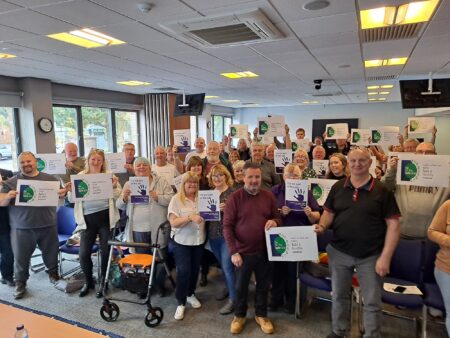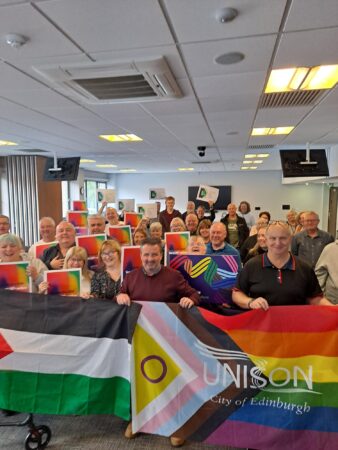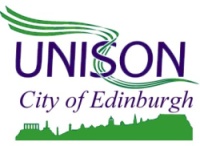 Please click here for a copy our 2024 workplace Violence at Work report, which was debated at our annual Health and Safety seminar in Stirling on Friday 11 October 2024, please print a copy of the report and place on notice boards. (The national committee continues to show our support and solidarity for UNISON’s Year of the LGBT+ Workers Campaign and the Palestine Solidarity Campaign)
Please click here for a copy our 2024 workplace Violence at Work report, which was debated at our annual Health and Safety seminar in Stirling on Friday 11 October 2024, please print a copy of the report and place on notice boards. (The national committee continues to show our support and solidarity for UNISON’s Year of the LGBT+ Workers Campaign and the Palestine Solidarity Campaign)
You can find the update SHE reporting guidelines here which was circulated to school and Early Years representatives. These guidelines are relevant to all council departments reporting verbal and physical abuse.
reporting verbal and physical abuse.
Press release: More than 65,000 assaults on public service workers in the last 12 months, says UNISON
Some main figures and points.
- 65,875 Assaults on public sector staff
- Local Government – 40,306
- Health – 18,378
- Police Scotland – 5,565
- Housing Associations – 1,296
- Higher Education – 43
- Further Education – 70
- NDPB’s – 38
- Leisure trusts – 169
- Scottish Government – 4
- Scottish Water – 6
Please remember that these are the reported incidents, we believe there is still a culture of non-reporting across all sectors, which means the figures will be even higher. We will continue to campaign & highlight this serious issue. Workplace Violence is “not part of the job” and never has been. Regrettably, we did not receive any response from the Scottish Fire & Rescue Service.
For the first time we also requested the number of incidents, of Sexual Harassment/Assault & Racial Abuse/Harassment. Clearly, employer’s, government and politician’s need to do much more, to tackle Violence in the Workplace.
Below is a detailed breakdown of the findings for Local Gov / City of Edinburgh Council from the 2024 Violence at Work report:
Rising Incidents in Educational settings:
- City of Edinburgh Council saw the majority of violent incidents occurring in schools and nurseries, following the same trend observed in other local authorities.
- Education support staff, particularly pupil support assistants, are among the most affected, with many of these incidents involving physical violence or verbal abuse from pupils.
- The report shows that 77% of violent incidents in local government across Scotland occur in education establishments, and Edinburgh is no exception. Staff working closely with children, particularly those with additional needs or behavioural challenges, are often on the front lines of this violence.
Increase in violent Incidents:
- The report noted a 14% increase in violent incidents reported by local authority staff across Scotland, and City of Edinburgh Council is part of this rising trend. Staff in roles beyond education, such as social work and social care, are also experiencing an increase in aggression and violence, driven by factors like public frustration with service cuts and increased workloads.
Data reporting challenges:
- The inconsistency in reporting violent incidents is a recurring issue for City of Edinburgh Council, as seen across many councils. In particular, the report highlights gaps in the collection of data related to protected characteristics under the Equality Act 2010, such as sex and race. This makes it difficult to understand whether certain groups of staff, such as women or minority ethnic workers, are disproportionately affected by workplace violence.
- The council has been cited for having challenges in collating data centrally, particularly regarding breakdowns by sex, job role, and type of incident (physical, verbal, or threatening behaviour). The lack of detailed incident breakdowns creates challenges for addressing specific risks or designing targeted interventions to protect vulnerable staff.
Types of incidents:
- Physical violence remains the most common type of incident reported in the council, especially in schools. However, verbal abuse and threats are also frequent, often involving parents or other members of the public, particularly in social care and public-facing roles.
- While the majority of incidents in education are driven by interactions with pupils, City of Edinburgh Council also reports instances of violence in other departments, including housing services and social work.
Workforce pressures and non-reporting:
- Like other councils, Edinburgh faces challenges with underreporting of violent incidents. Some staff may feel that reporting is pointless, particularly if they have experienced little support or follow-up from management in the past. There is also a culture in some departments where violence is seen as “part of the job,” particularly in education and social care settings.
- The report emphasises the need for a more effective reporting system to capture the true scale of violence against staff. It’s clear that the current approach is clearly underestimating the actual number of incidents including racial and sexual abuse, as many go unreported or are not recorded properly, including RIDDOR reports.
Action needed:
- The report calls on City of Edinburgh Council, like other local authorities, to ensure that all violent and abusive incidents are reported and followed up. This includes creating more robust reporting systems, training staff on how and when to report incidents, and ensuring that management takes these reports seriously by implementing policies to protect staff.
- There is also a need for the council to comply with its obligations under the Public Sector Equality Duty, ensuring that data on violence is collected and analysed to protect staff, especially those from vulnerable groups.
Conclusion:
City of Edinburgh Council is part of the broader national issue of rising violence in public services, particularly in education. The report highlights the need for stronger action from the council to ensure that all incidents are properly reported and addressed, with better protection and support for staff across all departments, but especially in schools and social services.

